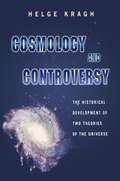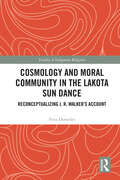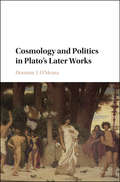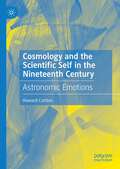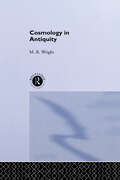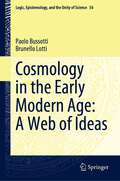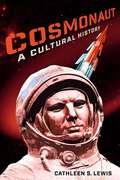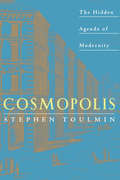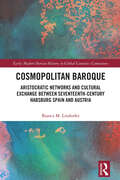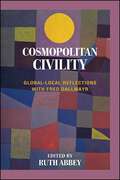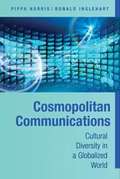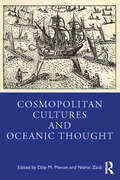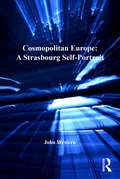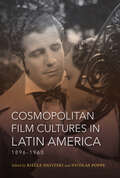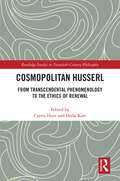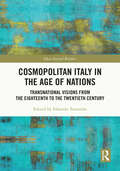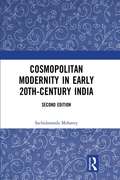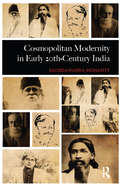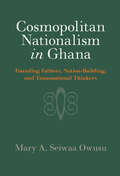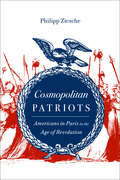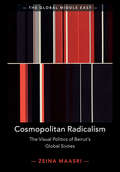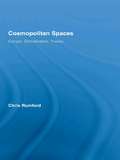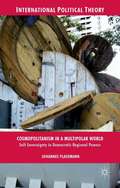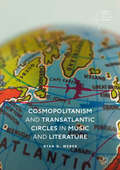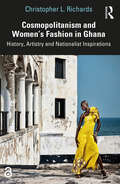- Table View
- List View
Cosmology and Controversy: The Historical Development of Two Theories of the Universe
by Helge KraghFor over three millennia, most people could understand the universe only in terms of myth, religion, and philosophy. Between 1920 and 1970, cosmology transformed into a branch of physics. With this remarkably rapid change came a theory that would finally lend empirical support to many long-held beliefs about the origins and development of the entire universe: the theory of the big bang. In this book, Helge Kragh presents the development of scientific cosmology for the first time as a historical event, one that embroiled many famous scientists in a controversy over the very notion of an evolving universe with a beginning in time. In rich detail he examines how the big-bang theory drew inspiration from and eventually triumphed over rival views, mainly the steady-state theory and its concept of a stationary universe of infinite age. In the 1920s, Alexander Friedmann and Georges Lemaître showed that Einstein's general relativity equations possessed solutions for a universe expanding in time. Kragh follows the story from here, showing how the big-bang theory evolved, from Edwin Hubble's observation that most galaxies are receding from us, to the discovery of the cosmic microwave background radiation. Sir Fred Hoyle proposed instead the steady-state theory, a model of dynamic equilibrium involving the continuous creation of matter throughout the universe. Although today it is generally accepted that the universe started some ten billion years ago in a big bang, many readers may not fully realize that this standard view owed much of its formation to the steady-state theory. By exploring the similarities and tensions between the theories, Kragh provides the reader with indispensable background for understanding much of today's commentary about our universe.
Cosmology and Moral Community in the Lakota Sun Dance: Reconceptualizing J. R. Walker's Account (Vitality of Indigenous Religions)
by Fritz DetwilerDrawing on Indigenous methodologies, this book uses a close analysis of James R. Walker’s 1917 monograph on the Lakota Sun Dance to explore how the Sun Dance communal ritual complex – the most important Lakota ceremony – creates moral community, providing insights into the cosmology and worldview of Lakota tradition. The book uses Walker’s primary source to conduct a reading of the Sun Dance in its nineteenth-century context through the lenses of Lakota metaphysics, cosmology, ontology, and ethics. The author argues that the Sun Dance constitutes a cosmic ethical drama in which persons of all types – human and nonhuman – come together in reciprocal actions and relationships. Drawing on contemporary animist theory and a perspectivist approach that uses Lakota worldview assumptions as the basis for analysis, the book enables a richer understanding of the Sun Dance and its role in the Lakota moral world. Offering a nuanced understanding that centers Lakota views of the sacred, this book will be relevant to scholars of religion and animism, and all those interested in Native American cultures and lifeways.
Cosmology and Politics in Plato’s Later Works
by O’meara Dominic J.Knowledge of the structure of the cosmos, Plato suggests, is important in organizing a human community which aims at happiness. This book investigates this theme in Plato's later works, the Timaeus, Statesman, and Laws. Dominic J. O'Meara proposes fresh readings of these texts, starting from the religious festivals and technical and artistic skills in the context of which Plato elaborates his cosmological and political theories, for example the Greek architect's use of models as applied by Plato in describing the making of the world. O'Meara gives an account of the model of which Plato's world is an image; of the mathematics used in producing the world; and of the relation between the cosmic model and the political science and legislation involved in designing a model state in the Laws. Non-specialist scholars and students will be able to access and profit from the book.
Cosmology and the Scientific Self in the Nineteenth Century: Astronomic Emotions
by Howard CarltonThis book argues that while the historiography of the development of scientific ideas has for some time acknowledged the important influences of socio-cultural and material contexts, the significant impact of traumatic events, life threatening illnesses and other psychotropic stimuli on the development of scientific thought may not have been fully recognised. Howard Carlton examines the available primary sources which provide insight into the lives of a number of nineteenth-century astronomers, theologians and physicists to study the complex interactions within their ‘biocultural’ brain-body systems which drove parallel changes of perspective in theology, metaphysics, and cosmology. In doing so, he also explores three topics of great scientific interest during this period: the question of the possible existence of life on other planets; the deployment of the nebular hypothesis as a theory of cosmogony; and the religiously charged debates about the ages of the earth and sun. From this body of evidence we gain a greater understanding of the underlying phenomena which actuated intellectual developments in the past and which are still relevant to today’s knowledge-making processes.
Cosmology in Antiquity (Sciences of Antiquity)
by Rosemary WrightThe popularity of Stephen Hawking's work has put cosmology back in the public eye. The question of how the universe began, and why it hangs together, still puzzles scientists. Their puzzlement began two and a half thousand years ago when Greek philosophers first 'looked up at the sky and formed a theory of everything.' Though their solutions are little credited today, the questions remain fresh.The early Greek thinkers struggled to come to terms with and explain the totality of their surroundings; to identitify an original substance from which the universe was compounded; and to reconcile the presence of balance and proportion with the apparent disorder of the universe.Rosemary Wright examines the cosmological theories of the `natural philosophers' from Thales, Anaximander and Anaximenes to Plato, the Stoics and the NeoPlatonists. The importance of Babylonian and Egyptian forerunners is emphasised.Cosmology in Antiquity is a comprehensive introduction to the cosmological thought of antiquity, the first such survey since Neugebauer's work of 1962.
Cosmology in the Early Modern Age: A Web of Ideas (Logic, Epistemology, and the Unity of Science #56)
by Paolo Bussotti Brunello LottiThis volume addresses the history and epistemology of early modern cosmology. The authors reconstruct the development of cosmological ideas in the age of ‘scientific revolution’ from Copernicus to Leibniz, taking into account the growth of a unified celestial-and-terrestrial mechanics. The volume investigates how, in the rise of the new science, cosmology displayed deep and multifaceted interrelations between scientific notions (stemming from mechanics, mathematics, geometry, astronomy) and philosophical concepts. These were employed to frame a general picture of the universe, as well as to criticize and interpret scientific notions and observational data.This interdisciplinary work reconstructs a conceptual web pervaded by various intellectual attitudes and drives. It presents an historical–epistemological unified itinerary which includes Copernicus, Kepler, Galileo, Descartes, Huygens, Newton and Leibniz. For each of the scientists and philosophers, a presentation and commentary is made of their cosmological views, and where relevant, outlines of their most relevant physical concepts are given. Furthermore, the authors highlight the philosophical and epistemological implications of their scientific works. This work is helpful both as a synthetic overview of early modern cosmology, and an analytical exposition of the elements that were intertwined in early-modern cosmology. This book addresses historians, philosophers, and scientists and can also be used as a research source book by post-graduate students in epistemology, history of science and history of philosophy.
Cosmonaut: A Cultural History
by Cathleen S. LewisHow the public image of the Soviet cosmonaut was designed and reimagined over time In this book, Cathleen Lewis discusses how the public image of the Soviet cosmonaut developed beginning in the 1950s and the ways this icon has been reinterpreted throughout the years and in contemporary Russia. Compiling material and cultural representations of the cosmonaut program, Lewis provides a new perspective on the story of Soviet spaceflight, highlighting how the government has celebrated figures such as Yuri Gagarin and Valentina Tereshkova through newspapers, radio, parades, monuments, museums, films, and even postage stamps and lapel pins. Lewis’s analysis shows that during the Space Race, Nikita Khrushchev mobilized cosmonaut stories and images to symbolize the forward-looking Soviet state and distract from the costs of the Cold War. Public perceptions shifted after the first Soviet spaceflight fatality and failure to reach the Moon, yet cosmonaut imagery was still effective propaganda, evolving through the USSR’s collapse in 1991 and seen today in Vladimir Putin’s government cooperation for a film on the 1985 rescue of the Salyut 7 space station. Looking closely at the process through which Russians continue to reexamine their past, Lewis argues that the cultural memory of spaceflight remains especially potent among other collective Soviet memories.
Cosmopolis: The Hidden Agenda of Modernity
by Stephen ToulminThis book chronicles a change of mind. When are we to think of the "modern" era as originating? What ideas or assumptions, about nature or society, have lain at the foundation of the "modern" program for human improvement? And how has the Western imagination come to outgrow these ideas and assumptions? Those are the central questions we need to tackle in this book.
Cosmopolitan Baroque: Aristocratic Networks and Cultural Exchange Between Seventeenth-Century Habsburg Spain and Austria (Early Modern Iberian History in Global Contexts)
by Bianca M. LindorferThis book examines the cultural relations between the Spanish and Austrian Habsburg monarchies in the seventeenth century and explores the central role of transnational aristocratic networks in cultural transfer processes between Spain and Central Europe. It tells the story of Central European aristocrats who embraced new foreign fashions, commodities, and practices to demonstrate their wealth and superior social position, thereby contributing significantly to the emergence of a cosmopolitan aristocratic Baroque culture. It shows that a new type of aristocrat emerged during this period: the cultured and educated aristocratic connoisseur, who knew how to use cultural imports and practices for his own strategic ends.However, the book also shows that not everyone was equally enthusiastic about the growing cultural imports, but that the boundaries between acceptance and rejection were often fluid. Covering a wide range of topics that span from early modern luxury consumption and food culture to collecting painting and the emergence of early modern aristocratic libraries, the book will appeal to a broad academic audience, including social and cultural historians, art historians, and cultural anthropologists alike.With its transnational scope, the book will be relevant to scholars interested in exploring the cosmopolitan nature of the early modern aristocracy also beyond the Austrian Habsburg monarchy.
Cosmopolitan Civility: Global-Local Reflections with Fred Dallmayr
by Ruth AbbeyProlific and pioneering, Fred Dallmayr has been an active scholar for over fifty years. His research interests include modern and contemporary political theory, hermeneutics, phenomenology, the Frankfurt School, continental political thought, democratic theory, multiculturalism, environmentalism, and cosmopolitanism. Dallmayr is also one of the founders of comparative political thought and his interest in non-Western political theory spans Chinese, Islamic, Indian, Buddhist, and Latin American traditions. In emulation of the vast interdisciplinary and international character of Dallmayr's work, this book draws upon senior and emerging scholars from an array of disciplines and countries, with essays that are philosophical (in the Western and non-Western traditions), cultural and/or political, and international. Dallmayr himself responds to the essays in a concluding chapter.
Cosmopolitan Communications: Cultural Diversity in a Globalized World
by Pippa Norris Ronald InglehartSocieties around the world have experienced a flood of information from diverse channels originating beyond local communities and even national borders, transmitted through the rapid expansion of cosmopolitan communications. For more than half a century, conventional interpretations, Norris and Inglehart argue, have commonly exaggerated the potential threats arising from this process. A series of fire-walls protect national cultures. This book develops a new theoretical framework for understanding cosmopolitan communications and uses it to identify the conditions under which global communications are most likely to endanger cultural diversity. The authors analyze empirical evidence from both the societal level and the individual level, examining the outlook and beliefs of people in a wide range of societies. The study draws on evidence from the World Values Survey, covering 90 societies in all major regions worldwide from 1981 to 2007. The conclusion considers the implications of their findings for cultural policies.
Cosmopolitan Cultures and Oceanic Thought
by Dilip M. Menon Nishat ZaidiThis book imagines the ocean as central to understanding the world and its connections in history, literature and the social sciences. Introducing the central conceptual category of ocean as method, it analyzes the histories of movement and traversing across connected spaces of water and land sedimented in literary texts, folklore, local histories, autobiographies, music and performance. It explores the constant flow of people, material and ideologies across the waters and how they make their presence felt in a cosmopolitan thinking of the connections of the world. Going beyond violent histories of slavery and indenture that generate global connections, it tracks the movements of sailors, boatmen, religious teachers, merchants, and adventurers. The essays in this volume summon up this miscegenated history in which land and water are ever linked. A significant rethinking of world history, this volume will be of great interest to scholars and researchers of history, especially connected history and maritime history, literature, and Global South studies.
Cosmopolitan Europe: A Strasbourg Self-portrait (Heritage, Culture and Identity)
by John WesternThe past hundred years of Europe are distilled in the experiences of the citizens of Strasbourg. From the turn of the twentieth century until 1945, Europe's ruling idea of nationalism rendered Strasbourg/Straßburg the prize in a tug-of-war between the two greatest continental powers, France and Germany. Then, in the immediate post-war period, ideals for European unity set up various European institutions, some headquartered in Strasbourg, which have gradually created a partially supranational Europe. At the end of the 1950s, a third theme arises: the large-scale settling in Strasbourg and other such richer, western European cities of persons from poorer lands, frequently ex-colonial territories, whose appearance and cultural practices render them essentially "different" to local eyes: expressions of racism thereby jostle with professions of multiculturalism. Now in the globalisation era, the issue of "immigration" has broadened yet further into transnationalism: the experience of persons who are embedded in varying manner in both Strasbourg and in their land of origin. Based on in-depth, lively interviews with 80 men and 80 women ranging from 101 to 20 years, and from all over the world (France, Germany, Alsace-Lorraine, Portugal, Italy, ex-Yugoslavia, Albania, Algeria, Morocco, Turkey, Cameroon, and Afghanistan amongst other countries), the author draws out of these compelling testimonies all sorts of compelling insights into issues of identity, race, nationality, culture, politics, heritage and representation, giving a unique and valuable view of what it means (and has meant over the past century) to be a European.
Cosmopolitan Film Cultures in Latin America, 1896–1960 (New Directions in National Cinemas)
by Rielle Navitski and Nicolas PoppeCosmopolitan Film Cultures in Latin America examines how cinema forged cultural connections between Latin American publics and film-exporting nations in the first half of the twentieth century. Predating today's transnational media industries by several decades, these connections were defined by active economic and cultural exchanges, as well as longstanding inequalities in political power and cultural capital. The essays explore the arrival and expansion of cinema throughout the region, from the first screenings of the Lumière Cinématographe in 1896 to the emergence of new forms of cinephilia and cult spectatorship in the 1940s and beyond. Examining these transnational exchanges through the lens of the cosmopolitan, which emphasizes the ethical and political dimensions of cultural consumption, illuminates the role played by moving images in negotiating between the local, national, and global, and between the popular and the elite in twentieth-century Latin America. In addition, primary historical documents provide vivid accounts of Latin American film critics, movie audiences, and film industry workers' experiences with moving images produced elsewhere, encounters that were deeply rooted in the local context, yet also opened out onto global horizons.
Cosmopolitan Husserl: From Transcendental Phenomenology to the Ethics of Renewal (Routledge Studies in Twentieth-Century Philosophy)
by Halla Kim Curtis HuttThis volume reflects on the themes and topics presented in Edmund Husserl’s articles published in the popular Japanese magazine Kaizōin 1923. It addresses the cosmopolitan nature of Husserl’s work as well as the enduring appeal of Husserl’s cultural phenomenology for today’s globalized age.The notions of crisis and renewal are clearly central to the thought of Husserl in his outreach to Japanese readers in his Kaizō articles. For Husserl, something critical from the European past had to be renewed to stop the catastrophe embodied in the Great War and its aftermath from getting worse. This volume explores Husserl’s earliest work on European Krisis, his unexpected interest in history, as well as his overlooked contributions to religion, politics, and the ethics of renewal. The chapters are divided into four main parts. Part 1 addresses general issues in Husserl’s cultural phenomenology with special attention paid to topics pursued in the Kaizō. Part 2 provides new work on Husserl and global phenomenology. It considers Husserlian engagements with Japanese and other East Asian philosophical and religious traditions, as well as the relevance of Husserl’s work for the global South, from the Caribbean to Africa. This volume includes chapters in Parts 1 and 2 that attempt to assay Husserl’s relationship to the European “other” as encountered in Jewish thought. In Part 3, there is a review of the publication of the Kaizō work in addition to an early history of Husserlian phenomenology in Japan. The editors reproduce the content of the first Kaizō article in the appendix, Part 4, supplying new reader‑friendly English and Japanese translations.Cosmopolitan Husserl will appeal to researchers and graduate students as well as advanced undergraduate students and the general public who are interested in Husserl, phenomenology, comparative philosophy, and religious studies.
Cosmopolitan Italy in the Age of Nations: Transnational Visions from the Eighteenth to the Twentieth Century (Ideas beyond Borders)
by Edoardo TortaroloModern Italian historiography has undergone a substantial revision in the last quarter of a century. From an almost exclusive focus on the process of nation-building, the attention of historians has shifted. The most innovative research is now devoted to assessing to what extent the cosmopolitan attitude that was evident in the late eighteenth century morphed, but did not disappear, in the ensuing two centuries. The essays in this volume make the case that the age of nations had a profound impact on Italian history and contributed to the creation of an Italian identity within the framework of well-functioning imperial and global networks. They also acknowledge that the process of national individualization carried with it a variety of aspects that reconnected Italian history to the foreign cultures that were undergoing constant self-fashioning. Cosmopolitan Italy in the Age of Nations: Transnational Visions from the Eighteenth to the Twentieth Century will be of interest to scholars throughout the world and intellectual and transnational historians.
Cosmopolitan Modernity in Early 20th-Century India
by Sachidananda MohantyThis book presents an alternative view of cosmopolitanism, citizenship and modernity in early 20th-century India through the multiple lenses of mysticism, travel, friendship, art, and politics. It makes a key intervention in the understanding of cosmopolitan modernity based on the lives and experiences of Rabindranath Tagore, Ananda Coomaraswamy, Sri Aurobindo, Mirra Alfassa, James Cousins, Paul Richard, Dilip Kumar Roy, and Taraknath Das. Using archival texts and photographs, Mohanty interrogates the ideas of tradition and modernity, the local and the global, and Self and the world as integral to the conception of a cosmopolitan world order. This second edition will interest scholars and students of modern Indian history, comparative literature, cultural studies, Indian philosophy, and South Asian studies and the general reader.
Cosmopolitan Modernity in Early 20th-Century India
by Sachidananda MohantyThis book presents an alternative view of cosmopolitanism, citizenship and modernity in early 20th-century India through the multiple lenses of mysticism, travel, friendship, art, and politics.It makes a key intervention in the understanding of cosmopolitan modernity based on the lives and experiences of Rabindranath Tagore, Ananda Coomaraswamy, Sri Aurobindo, Mirra Alfassa, James Cousins, Paul Richard, Dilip Kumar Roy, and Taraknath Das. Using archival texts and photographs, Mohanty interrogates the ideas of tradition and modernity, the local and the global, and Self and the world as integral to the conception of a cosmopolitan world order. The volume will interest scholars and students of modern Indian history, comparative literature, cultural studies, Indian philosophy, and South Asian studies and the general reader.
Cosmopolitan Nationalism in Ghana: Founding Fathers, Nation-Building, and Transnational Thinkers
by Mary A. OwusuNineteenth and twentieth-century West African writer-intellectuals harnessed their Atlantic networks to explore ideas of race, regeneration, and nation-building. Yet, the ultimately cosmopolitan nature of these political and intellectual pursuits has been overlooked by dominant narratives of anti-colonial history. In contrast, Cosmopolitan Nationalism in Ghana uses cosmopolitanism as a primary theoretical tool, interrogating the anti-colonial writings that prop up Ghana's nationalist history under a new light. Mary A. Seiwaa Owusu highlights the limitations of accepted labels of nationalist scholarship and confirms that these writer-intellectuals instead engaged with ideas around the globe. This study offers a more complex account of the nation-building project, arguing for the pivotal role of other groups and factors in addition to Kwame Nkrumah's leadership. In turn, it proposes a historical account which assumes a cosmopolitan setting, highlights the centrality of debate, and opens a vista for richer understandings of Ghanaians' longstanding questions about thriving in the world.
Cosmopolitan Patriots: Americans in Paris in the Age of Revolution (Jeffersonian America)
by Philipp ZiescheThis truly transnational history reveals the important role of Americans abroad in the Age of Revolution, as well as providing an early example of the limits of American influence on other nations. From the beginning of the French Revolution to its end at the hands of Napoleon, American cosmopolitans like Thomas Jefferson, Gouverneur Morris, Thomas Paine, Joel Barlow, and James Monroe drafted constitutions, argued over violent means and noble ends, confronted sudden regime changes, and negotiated diplomatic crises such as the XYZ Affair and the Louisiana Purchase. Eager to report on what they regarded as universal political ideals and practices, Americans again and again confronted the particular circumstances of a foreign nation in turmoil. In turn, what they witnessed in Paris caused these prominent Americans to reflect on the condition and prospects of their own republic. Thus, their individual stories highlight overlooked parallels between the nation-building process in both France and America, and the two countries' common struggle to reconcile the rights of man with their own national identities.
Cosmopolitan Radicalism: The Visual Politics of Beirut's Global Sixties (The Global Middle East #13)
by Zeina MaasriExploring the intersections of visual culture, design and politics in Beirut from the late 1950s to the mid-1970s, this compelling interdisciplinary study critically examines a global conjuncture in Lebanon's history, marked by anticolonial struggle and complicated by a Cold War order. Against a celebratory reminiscence of the 'golden years', Beirut's long 1960s is conceived of as a liminal juncture, an anxious time and space when the city held out promises at once politically radical and radically cosmopolitan. Zeina Maasri examines the transnational circuits that animated Arab modernist pursuits, shedding light on key cultural transformations that saw Beirut develop as a Mediterranean site of tourism and leisure, a nexus between modern art and pan-Arab publishing and, through the rise of the Palestinian Resistance, a node in revolutionary anti-imperialism. Drawing on uncharted archives of printed media this book expands the scope of historical analysis of the postcolonial Arab East.
Cosmopolitan Spaces: Europe, Globalization, Theory (Routledge Advances in Sociology)
by Chris RumfordCosmopolitan Spaces: Europe, Globalization, Theory endeavors a highly innovative reading of both globalization theory and contemporary European transformations. Interpreting cosmopolitanism as a politics of space, Rumford positions his analysis at the intersection of two exciting currents in contemporary social science research: the ‘spatial turn’ in the social sciences and the renewed interest in cosmopolitanism. Rumford elaborates a completely new theoretical framework for understanding the contemporary social and political transformation of Europe, and takes issue with many aspects of the globalization-inspired accounts of Europeanization which remain blind to the spatial dimensions of change. In addition to its compelling reading of cosmopolitanism, Cosmopolitan Spaces: Europe, Globalization, Theory, offers a provocative critique for thinking about Europe in terms of Empire, and advances the startling claim that Europe should be considered ‘postwestern’.
Cosmopolitanism In A Multipolar World
by Johannes PlagemannPopular wisdom, international relations scholarship, and much of rising powers' foreign policy rhetoric contends that such powers comprise a conservative coalition united by the desire to protect the principle of national sovereignty against its erosion. However, the empirical analysis of three democratic rising and regional powers' understandings and practices of political sovereignty suggests otherwise. On the basis of empirical research in Brazil, India, and South Africa, this book presents a descriptive analysis of the transformation of sovereignty in non-western contexts since the end of the Cold War. The book argues that the processes of change are most accurately captured by a novel ideal-type of 'soft sovereignty'. Soft sovereignty takes into account today's complex multi-polar order in a post-western world. Such a plural, embedded, and moderate cosmopolitanism is situated between globalism's demand for a world state and statism's defence of the status quo.
Cosmopolitanism and Transatlantic Circles in Music and Literature (Palgrave Studies In Music And Literature Ser.)
by Ryan R. WeberCosmopolitanism and Transatlantic Circles in Music and Literature traces the transatlantic networks that were constructed between a select group of composers, including Edvard Grieg, Edward MacDowell, and Percy Grainger, and the writers with whom they shared cosmopolitan affinities, including Arne Garborg, Hamlin Garland, Madison Grant, and Lathrop Stoddard. Each overlapping case study surveys the diachronic transmission of cosmopolitanism as well as the synchronic practices that animated these modernist ideas. Instead of taking a strictly chronological approach to organization, each chapter offers an examination of the different layers of identity that expanded and contracted in relation to a mutual interest in Nordic culture. From the burgeoning “universal” ambitions around 1900 to the darker racialized discourse of the 1920s, this study offers a critical analysis of both the idea and practice of cosmopolitanism in order to expose its common foundations as well as the limits of its application.
Cosmopolitanism and Women’s Fashion in Ghana: History, Artistry and Nationalist Inspirations
by Christopher L. RichardsDrawing on extensive archival research and interviews, this book delves into the rich world of Ghanaian fashion, demonstrating how, over time, local dress styles and materials have been fused with global trends to create innovative, high fashion garments that reflect a distinctly Ghanaian cosmopolitanism. Ghana has a complex and diverse fashion culture which was in evidence before independence in 1957 and has continued to grow in reputation in the postcolonial period. In this book, Christopher Richards reflects on the contributions of the country’s female fashion designers, who have employed fashion to innovate existing, culturally relevant dress styles, challenge gendered forms of dress, and make bold statements regarding women’s sexuality. Treated as artworks, the book examines specific garments to illustrate the inherent complexity of their design and how fashion is often embedded with a blending of personal histories, cultural practices and global inspirations. Reflecting in particular on the works of Laura Quartey, Letitia Obeng, Juliana Kweifio-Okai, Beatrice Arthur and Aisha Ayensu, this book makes an important and timely contribution to art history, fashion studies, anthropology, history, women’s studies and African Studies.
